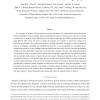Free Online Productivity Tools
i2Speak
i2Symbol
i2OCR
iTex2Img
iWeb2Print
iWeb2Shot
i2Type
iPdf2Split
iPdf2Merge
i2Bopomofo
i2Arabic
i2Style
i2Image
i2PDF
iLatex2Rtf
Sci2ools
260
click to vote
PE
2015
Springer
2015
Springer
On optimal monitor placement for localizing node failures via network tomography
We investigate the problem of placing monitors to localize node failures in a communication network from binary states (normal/failed) of end-to-end paths, under the assumption that a path is in normal state if and only if it contains no failed nodes. To uniquely localize failed nodes, the measurement paths must show different symptoms (path states) under different failure events. Our goal is to deploy the minimum set of monitors to satisfy this condition for a given probing mechanism. We consider three families of probing mechanisms, according to whether measurement paths are (i) arbitrarily controllable, (ii) controllable but cycle-free, or (iii) uncontrollable (i.e., determined by the default routing protocol). We first establish theoretical conditions that characterize network-wide failure identifiability through a per-node identifiability measure that can be efficiently evaluated for the above three probing mechanisms. Leveraging these results, we develop a generic monitor pl...
Optimization | PE 2015 |
Related Content
| Added | 16 Apr 2016 |
| Updated | 16 Apr 2016 |
| Type | Journal |
| Year | 2015 |
| Where | PE |
| Authors | Liang Ma, Ting He, Ananthram Swami, Don Towsley, Kin K. Leung |
Comments (0)

